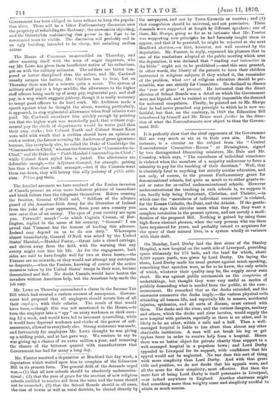On Monday, Lord Derby laid the first stone of the
Stanley Hospital, a new hospital on the north side of Liverpool, providing space ultimately for 176 beds, and the land for which, about 8,000 square yards, was given by Lord Derby. On laying the stone, Lord Derby made his usual protest against much speaking, remarking that speeches were, as far as he knew, the only article of which, whatever their quality may be, the supply never runs short. He was against public ceremonials on the completion of undertakings, but thought they were very useful as modes of publicly demanding what is needed from the public, at the com- mencement. He remarked that as the docks extended, and the enormous commerce the docks imply,—the various physical evils attending all human life, and especially life in masses, accidental injuries, epidemics, and all sorts of disease, must extend with them. The docks and the river, and the various dangers, sanitary and others, which the docks and river involve, would supply the new hospital with patients, especially as there is no other, and is likely to be no other, within a mile and a half. Then a well- managed hospital is liable to less abuse than almost any other charitable institution. A man will not break his leg or get typhus fever in order to receive help from a hospital. Hence there was no better object for private charity than support to a well-managed hospital in a populous town ; and Lord Derby appealed to Liverpool for its support, with confidence that his appeal would not be neglected. No one does this sort of thing with more simplicity than Lord Derby. And with that great title and position, we do not doubt that his appeals were, and all the more for their simplicity, most effective. But then the mere fact of being Lord Derby is itself persuasive in Liverpool, —or indeed anywhere in England. Another chairman might find something more than weighty sense and simplicity needful to attain as much success.






























 Previous page
Previous page